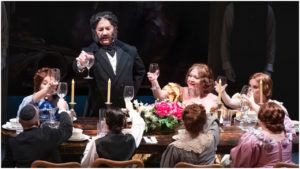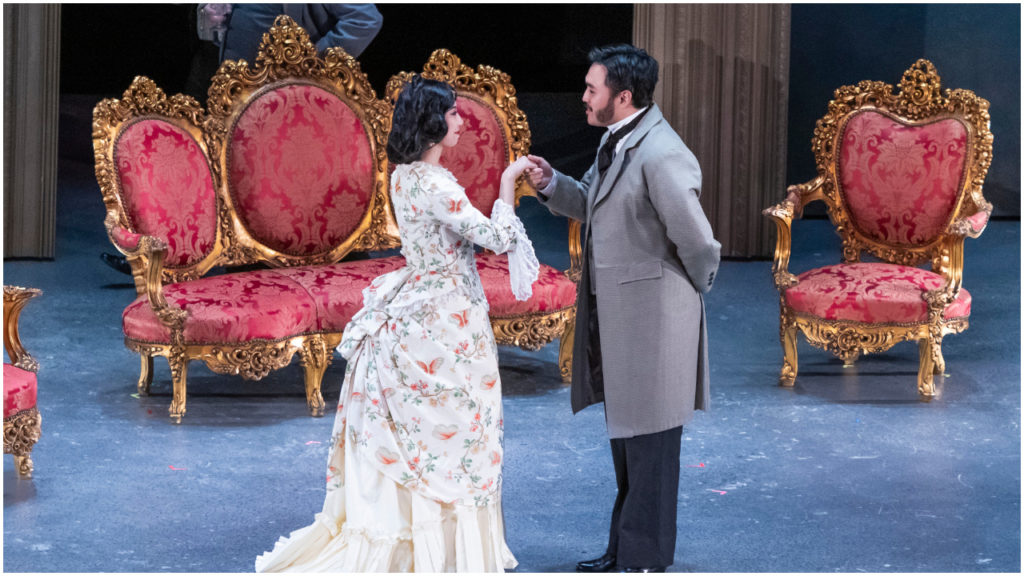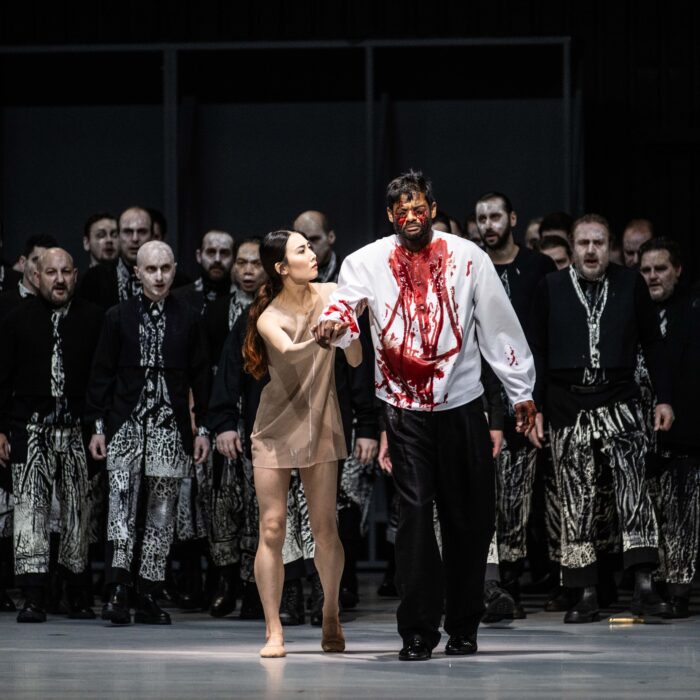
Frost School of Music 2022 Review: The Leopard
Students Shine in World Premiere of Renowned Italian Tale
By Logan MartellOn March 5, 2022, the University of Miami’s Frost Opera School presented the world premiere of Michael Dellaira and J.D. McClatchy’s adaptation of “The Leopard.” This new work brings to the stage the novel by Giuseppe Tomasi di Lampedusa which has since become a renowned work of Italian literature, painting in poignant hues the decline of nobility during the Risorgimento. Led by Maestro Gerard Schwarz, the cast featured a number of veteran artists, joined by students of the opera program.
Spirited Ensemble
Leading up the cast was Kim Josephson as the titular Prince of Salina. From his entrance, he displayed a character with great emotional investment not only in the well-being of his immediate family, but the future of the Italian states as well. Stalwart in tone and articulate in gesture, he made an excellent partner for most of the singers to play off, and his approaches in dealing with their many perspectives and personalities was similarly multifaceted.
As Tancredi Falconeri, tenor Minghao Liu finely conveyed the passionate nature of the prince’s nephew. His entrance carrying the wounded Cavriaghi let him display clear and ardent tones as he expressed his belief in the revolution and in the changing times. With Yang’s Angelica, this passion translated well into romantically-charged moments such as their tender meeting at the ball, or when he proudly declared his love with the phrase “My name, my sword, and my life.” Liu consistently made the most of these instances, bringing authenticity as Tancredi himself changes over the years.
In the role of Angelica, Don Calogero’s daughter, soprano Yaqi Yang was exceedingly charming as she seized on her heart’s desire with clear and excited tones and often-playful energy. This endearing aspect of her character made a fine contrast when moments of happiness for her, such as her debut at the ball and Tancredi’s proposal, often elicited great distress from the other characters and the orchestra, reinforcing the sense of the family’s approaching downfall. Through moments such as these, Yang displayed an exuberant and soaring soprano which danced at the forefront of the texture.
As Don Calogero, the rising mayor of Donnafugata, baritone Thandolwethu Mamba splendidly masked the don’s ambitions with a chilling refinement in bearing and voice. His interactions with the prince carried almost like a duel of wills as each party very politely tried to use the other for their ends. His sturdy voice kept him present during ensemble moments, and while Mamba himself is only about half as old as the don is meant to be, this younger portrayal visually supported Calogero as part of the nouveau riche he represents. Moments of note include the brief trio between him, the prince, and Father Pirrone as he argued in favor of presenting his daughter, and when he made a grand gesture of bestowing Angelica with a dowry to help seal the deal of marriage.
In the role of Concetta, the prince’s daughter, soprano Margarita Parsamyan poignantly carried a great deal of drama as both a spurned woman in love and as the eventual survivor of the family, whose perspective becomes the lens through which we see the state they fall to open and close the work. Here we see an aggrieved scene between her, her sisters, and the now-regal Angelica, which reinforced the reversal of fortune between the two women. For the brevity of many of the preceding numbers, this one, in particular, felt like it was given more time to flesh things out and yet spent it on the character’s merely repeating their thoughts and intentions, though this itself did build into a powerful and painful moment from Parsamyan as she lamented all that’s happened since. Her arc from happiness to sorrow over the years was deeply touching for one who was often a bystander in events, making it all the more impactful when she wept at her own lack of agency.
Certain conventions familiar to opera were played very well, such as the comic nature of the priest, Father Pirrone. Frank Ragsdale’s interpretation was often a source of humor as the exasperated priest cried out his worries over the nation’s turmoil and the fate of the prince’s family. The same could be said for Robynne Redmond as The Prince’s wife, Stella. Her plush mezzo-soprano often beamed as the mother fretted away over numerous concerns to comedic effect. One notable moment came during the ensemble number at the ball where, as Calogero discussed the approaching army and what will ensue, Stella sonorously mocked his breaches of etiquette and the manner of his clothing, showing the disparity of interests between the classes.

The stage was often filled with characters who lent their voices and emotions to the ensemble, such as tenor Kevin Gwinn as Tancredi’s friend, Count Cavriaghi; sopranos Abby Guido and Mia Flora as The Prince’s daughters Caterina and Carolina, respectively; and mezzo Caroline Morale Mejia in the trouser role of Francesco Paolo.
The music itself bore a number of traditional and relatively-modern aspects, being through-composed, and often directly conveying the emotions of the character in focus through motifs. While it did not lack for expression, there were times when it felt as though the brevity of the musical numbers did not allow for a deeper look into the character’s inner worlds. Instead, much of this was revealed through momentary freezes in the drama, almost always indicated by a wash of purple lighting, where the characters would reflect alone on their thoughts; there were moments, however, where this technique was broken and characters could permeate the boundary, or at least attempt to, such as when Concetta could not reach the newly-infatuated Tancredi, hugging him from behind to no avail or reaction.
Wandering Eyes
One notable aspect of the music was its focus on transitory material, where the orchestra would play a theme or idea, repeat it as its corresponding emotion played out, then introduce a new musical figure which would enter the texture and begin to lead it elsewhere, rinse and repeat. While this worked well in moments where the perspective shifts and we peer into the other character’s thoughts, there were times where it reinforced the wandering impression created by the frequent locale and scene changes. One example of this came when Angelica and Tancredi flirt and caress in an empty wing of the estate for only a minute or so before the extras reassemble the set to take us back to the main chambers.
The work itself was opened with a very brief, silent auction set after 1910, showing the ultimate dissolution of the estate, before taking us to 1910 where the aged Concetta recollects the events of the story until it catches up towards the end of the final act. While one could debate the pros and cons of having a flashback within a flashback, the perspectives wandered more in a personal and geographic sense than a temporal one; I wondered far less about when we were rather than where we were or where we were going next, having missed one or two locale changes announced by the supertitles which, due merely to my seating in the first few rows, was a little past the edge of my periphery.
The character’s lines were delivered through a nearly-constant parlando which, while blurring the lines between the worlds of dialogue and singing, often melded in a way that softened the passion of the numbers. The libretto itself was in English, with the exception of a handful of lines from the children’s French tutor, and while this did make it easier to follow along without the supertitles, I couldn’t help but find it at odds in a work where Italian identity is so prominent. The text of the novel itself is rich with imagery and contemplation, and in such style that one could usually tell what was translated from the author and what was from the librettist. There were also moments where character’s seemingly introduced themselves to no one, being delivered in frozen moments of introspection. One example of this was Angelica’s introduction in the ballroom, repeating “I am Angelica! I’m so happy to be here,” to herself; another was Cavaliere Chevalley’s introduction where he states his name, office, and titles to the audience, but this latter example was done in a way which made it feel more like an irreverent musing on the pomp of his position, rather than him introducing himself to himself.
In all, there was much to enjoy from this fascinating take on Lampedusa’s novel, from the highly expressive music to the highly-promising cast of young artists backed by seasoned professionals. For the themes and setting which ring close to so many of the operatic classics we hold dear, much of the work felt right at home within the medium, and one could almost forget that Saturday’s performance was the world premiere and not the presentation of a much older, overlooked work. I can see Dellaira and McClatchy’s “The Leopard” working very well among schools and conservatories where the wide cast and shifting perspective allows for brief but ample musical opportunities for the students to display their respective gifts. While inevitably bearing some differences from its source material in terms of tone and execution, this adaptation highlights and celebrates many of the qualities which make opera such a unique and captivating way of sharing stories.



